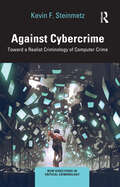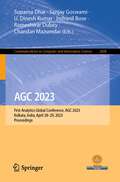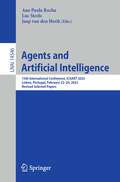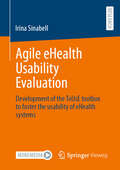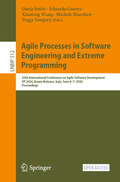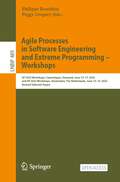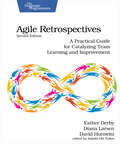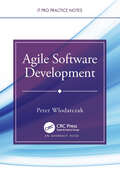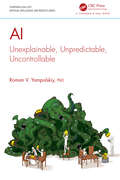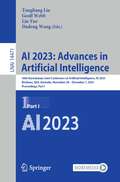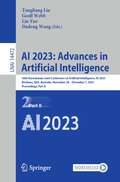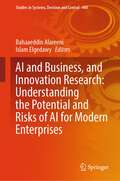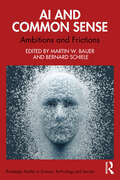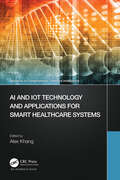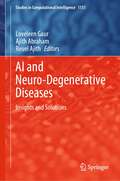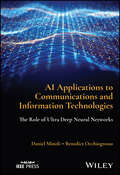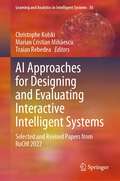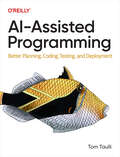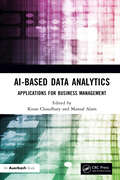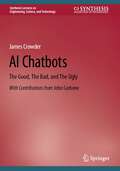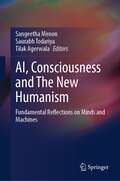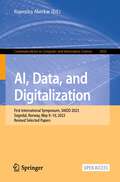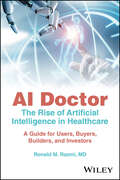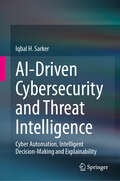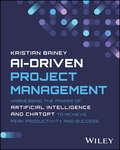- Table View
- List View
Against Cybercrime: Toward a Realist Criminology of Computer Crime (New Directions in Critical Criminology)
by Kevin F. SteinmetzThis book advances a theoretically informed realist criminology of computer crime. Looking beyond current strategies of online crime control, this book argues for a new sort of policy that addresses the root causes of computer crime and criminality, reduces the harms experienced by the victims of such crimes, and does not unduly contribute to state and corporate power and surveillance. Drawing both on the proponents of realist criminology and on those who have leveled critiques of the approach, Steinmetz illustrates the contours of a realist criminology of computer crime by considering definitions of harm with online crime, the idiosyncrasies of online locality and community, the social relations of computer crime, the tension between piecemeal reform and structural changes, and other matters. Furthermore, Steinmetz surveys the methodological dimensions of computer crime research, offers a critique of positivist “computational criminology,” and posits an agenda for computer crime policy. Against Cybercrime is an essential reading for all those engaged with cybercrime, realist criminology, criminological theory, and social harm online.
AGC 2023: First Analytics Global Conference, AGC 2023, Kolkata, India, April 28–29, 2023, Proceedings (Communications in Computer and Information Science #2008)
by Suparna Dhar Sanjay Goswami U. Dinesh Kumar Indranil Bose Rameshwar Dubey Chandan MazumdarThis book constitutes the refereed proceedings of the 1st Analytics Global Conference, AGC 2023, held in Kolkata, India, in April 2023. The AGC conference sought to facilitate industry-academia interfacing in the domain of machine learning and artificial intelligence.The 11 full papers presented in these proceedings were carefully reviewed and selected from 36 submissions. The papers are organized in the two topical sections: Applications of Analytics in Business and Machine Learning & Deep Learning and Text Analytics.
Agents and Artificial Intelligence: 15th International Conference, ICAART 2023, Lisbon, Portugal, February 22–24, 2023, Revised Selected Papers (Lecture Notes in Computer Science #14546)
by Ana Paula Rocha Luc Steels Jaap van den HerikThis book contains the revised and extended versions of selected papers from the 15th International Conference on Agents and Artificial Intelligence, ICAART 2023, held in Lisbon, Portugal, during February 22–24, 2023. The 23 full papers included in this book were carefully reviewed and selected from 306 submissions. The conference was organized in 2 tracks as follows: One track focuses on Agents, Multi-Agent Systems and Software Platforms, Distributed Problem Solving and Distributed AI in general. The other track focuses mainly on Artificial Intelligence, Knowledge Representation, Planning, Learning, Scheduling, Perception Reactive AI Systems, and Evolutionary Computing and other topics related to Intelligent Systems and Computational Intelligence.
Agile eHealth Usability Evaluation: Development of the ToUsE toolbox to foster the usability of eHealth systems
by Irina SinabellThe integration of usability evaluations into iterative software development processes is becoming increasingly relevant, as gathering feedback from prospective users is crucial to improving the usability of eHealth systems. Traditional approaches to eHealth usability evaluation, however, are difficult to reconcile with the iterative software development process, which is why there is an increasing need for agile usability evaluation. Despite the existence of approaches to agile usability evaluation, it is unclear whether they are suitable to rapidly evaluate patient-centered eHealth systems being iteratively developed in health care applicable, for prospective users such as elderly persons suffering from age-related declines. This research includes an innovative and comprehensive toolbox called ToUsE, toolbox for eHealth usability evaluation, which consists of more than 40 rapidly deployable and potentially useful eHealth usability evaluation methods developed by the author. The ToUsEtoolbox is intended for use by software developers, medical informaticians, usability experts, or medical professionals who aim at performing an eHealth usability evaluation. The book provides detailed descriptions of all the eHealth usability evaluation methods included in ToUsE.
Agile Processes in Software Engineering and Extreme Programming: 25th International Conference on Agile Software Development, XP 2024, Bozen-Bolzano, Italy, June 4–7, 2024, Proceedings (Lecture Notes in Business Information Processing #512)
by Xiaofeng Wang Peggy Gregory Eduardo Guerra Michele Marchesi Darja ŠmiteThis open access book constitutes the proceedings of the 25th International Conference on Agile Software Development, XP 2024, which took place in Bozen-Bolzano, Italy, during June 04-07, 2024. XP is the premier agile software development conference combining research and practice. It is a unique forum where agile researchers, practitioners, thought leaders, coaches, and trainers get together to present and discuss their most recent innovations, research results, experiences, concerns, challenges, and trends. XP conferences provide an informal environment to learn and trigger discussions and welcome both people new to agile and seasoned agile practitioners. This year’s conference was held with the theme “Reflect, Adapt, Envision”. The 10 full and 2 short papers included in these proceedings were carefully reviewed and selected from 32 submissions. They were organized in topical sections as follows: agile at scale; value and quality in agile; and people and teams in agile.
Agile Processes in Software Engineering and Extreme Programming – Workshops: XP 2022 Workshops, Copenhagen, Denmark, June 13–17, 2022, and XP 2023 Workshops, Amsterdam, The Netherlands, June 13–16, 2023, Revised Selected Papers (Lecture Notes in Business Information Processing #489)
by Philippe Kruchten Peggy GregoryThis open access book constitutes papers from the research workshops presented at XP 2022 and XP 2023, respectively the 23rd and 24th International Conferences on Agile Software Development, held on June 13-17, 2022 at the IT University of Copenhagen, Denmark and June 13-16, 2023 in Amsterdam, Netherlands. XP is the premier agile software development conference combining research and practice. It is a unique forum where agile researchers, practitioners, thought leaders, coaches, and trainers get together to present and discuss their most recent innovations, research results, experiences, concerns, challenges, and trends. XP conferences provide an informal environment to learn and trigger discussions and welcome both people new to agile and seasoned agile practitioners. In 2022, the following workshops took place: ● 3rd International Workshop on Agility with Microservices Programming● 2nd International Workshop on Agile Sustainability● Agile and EducationIn 2023, six workshops were held: ● Workshop on Organisational Debt and Large-Scale Agile● Workshop on Software-Intensive Business● Workshop on Global and Hybrid Work● Workshop on Fear-Based Agile Transformation● Workshop on AI-assisted Agile● Workshop on Agile-Quantum Software EngineeringIn 2022, 6 workshop papers were accepted for publication in these post-proceedings, out of 11 submissions, and in 2023, 15 papers were accepted for publication out of 38 submissions.
Agile Retrospectives, Second Edition
by David Horowitz Esther Derby Diana LarsenIn an uncertain and complex world, learning is more important than ever before. In fact, it can be a competitive advantage. Teams and organizations that learn rapidly deliver greater customer value faster and more reliably. Furthermore, those teams are more engaged, more productive, and more satisfied. The most effective way to enable teams to learn is by holding regular retrospectives. Unfortunately, many teams only get shallow results from their retrospectives. This book is filled with practical advice, techniques, and real-life examples that will take retrospectives to the next level--whether your team is co-located, hybrid, or remote. This book will help team leads, scrum masters, and coaches engage their teams to learn, improve, and deliver greater results. For nearly two decades, scrum masters, team leads, and coaches have relied on the first edition of Agile Retrospectivesas an essential resource to facilitate better retrospectives. This edition builds on recent research, reflects the authors' experiences over two decades, and shares wisdom gleaned from the global retrospective community. Find practical advice to level up retrospective skills. Address the challenges of remote and hybrid retrospectives head on. Take advantage of expanded guidance on designing and facilitating retrospectives--based on the questions and concerns of practitioners worldwide. Gain insight into choosing a broad or narrow focus for retrospectives. Explore how to use both objective and subjective data to enable more effective conversations. Learn how to make decisions that stick. Understand the importance of psychological safety and how to foster it in retrospectives. Elevate issues and engage managers in systemic change. Learn from many real-life stories that demonstrate how our advice has impacted retrospectives at organizations around the globe. Finally, find a set of recommended flows that reveal the authors' thought process in designing retrospectives for scenarios teams faced in real life.
Agile Software Development (IT Pro Practice Notes)
by Peter WlodarczakAgile Software Development is an introduction to agile software development methods. Agile methods try to diminish complexity, increase transparency, and reach a deployable product in a shorter time frame. Agile methods use an iterative and incremental approach to minimize risks and to avoid maldevelopment. The book gives a short introduction to agile methods and agile software development principles. It serves as a study book and as a reference manual. Based on the official Scrum Guide, the book also covers other topics such as best practices for agile software development and agile testing. It targets practitioners who want to start with agile software development, as well as developers or project managers who already use agile methodologies. The book can be read from the beginning, but each chapter has been written in a way so it can be read individually.
AI: Unexplainable, Unpredictable, Uncontrollable (Chapman & Hall/CRC Artificial Intelligence and Robotics Series)
by Roman V. YampolskiyDelving into the deeply enigmatic nature of Artificial Intelligence (AI), AI: Unexplainable, Unpredictable, Uncontrollable explores the various reasons why the field is so challenging. Written by one of the founders of the field of AI safety, this book addresses some of the most fascinating questions facing humanity, including the nature of intelligence, consciousness, values and knowledge.Moving from a broad introduction to the core problems, such as the unpredictability of AI outcomes or the difficulty in explaining AI decisions, this book arrives at more complex questions of ownership and control, conducting an in-depth analysis of potential hazards and unintentional consequences. The book then concludes with philosophical and existential considerations, probing into questions of AI personhood, consciousness, and the distinction between human intelligence and artificial general intelligence (AGI).Bridging the gap between technical intricacies and philosophical musings, AI: Unexplainable, Unpredictable, Uncontrollable appeals to both AI experts and enthusiasts looking for a comprehensive understanding of the field, whilst also being written for a general audience with minimal technical jargon.
AI 2023: 36th Australasian Joint Conference on Artificial Intelligence, AI 2023, Brisbane, QLD, Australia, November 28–December 1, 2023, Proceedings, Part I (Lecture Notes in Computer Science #14471)
by Tongliang Liu Geoff Webb Lin Yue Dadong WangThis two-volume set LNAI 14471-14472 constitutes the refereed proceedings of the 36th Australasian Joint Conference on Artificial Intelligence, AI 2023, held in Brisbane, QLD, Australia during November 28 – December 1, 2023. The 23 full papers presented together with 59 short papers were carefully reviewed and selected from 213 submissions. They are organized in the following topics: computer vision; deep learning; machine learning and data mining; optimization; medical AI; knowledge representation and NLP; explainable AI; reinforcement learning; and genetic algorithm.
AI 2023: 36th Australasian Joint Conference on Artificial Intelligence, AI 2023, Brisbane, QLD, Australia, November 28–December 1, 2023, Proceedings, Part II (Lecture Notes in Computer Science #14472)
by Tongliang Liu Geoff Webb Lin Yue Dadong WangThis two-volume set LNAI 14471-14472 constitutes the refereed proceedings of the 36th Australasian Joint Conference on Artificial Intelligence, AI 2023, held in Brisbane, QLD, Australia during November 28 – December 1, 2023. The 23 full papers presented together with 59 short papers were carefully reviewed and selected from 213 submissions. They are organized in the following topics: computer vision; deep learning; machine learning and data mining; optimization; medical AI; knowledge representation and NLP; explainable AI; reinforcement learning; and genetic algorithm..
AI and Business, and Innovation Research: Understanding the Potential and Risks of AI for Modern Enterprises (Studies in Systems, Decision and Control #440)
by Bahaaeddin Alareeni Islam ElgedawyThis book provides a comprehensive overview of the latest trends and developments in AI and business innovation research. In today's rapidly changing business environment, artificial intelligence (AI) has become an essential tool for innovation and growth. From marketing and customer service to supply chain management and product development, AI is transforming the way businesses operate, allowing them to make better decisions and achieve their goals faster and more efficiently than ever before.However, the integration of AI into business operations is not without its challenges and risks. There are concerns about data privacy, cybersecurity, and the potential for AI to disrupt traditional industries and displace workers. As a result, it is essential for business leaders and researchers to understand both the potential and risks of AI, and how it can be effectively leveraged for business innovation.This book explores the potential benefits of AI for modern enterprises, including how it can be used to enhance customer service, optimize supply chain management, and improve decision-making in a range of business contexts. It also examines the role of AI in product development, marketing, and sales, and how it can be used to drive innovation and growth.The book also examines the risks and challenges associated with the integration of AI into business operations. It explores the ethical and legal implications of AI, including issues related to data privacy and security, bias in algorithms, and the impact of AI on employment and the labor market. It also examines the role of government and policymakers in regulating AI and managing the risks associated with its integration into business operations.Overall, this book provides a comprehensive and balanced perspective on the potential and risks of AI for modern enterprises.
AI and Common Sense: Ambitions and Frictions (Routledge Studies in Science, Technology and Society)
by Martin W. Bauer and Bernard SchieleCommon sense is the endless frontier in the development of artificial intelligence, but what exactly is common sense, can we replicate it in algorithmic form, and if we can – should we?Bauer, Schiele and their contributors from a range of disciplines analyse the nature of common sense, and the consequent challenges of incorporating into artificial intelligence models. They look at different ways we might understand common sense and which of these ways are simulated within computer algorithms. These include sensory integration, self-evident truths, rhetorical common places, and mutuality and intentionality of actors within a moral community. How far are these possible features within and of machines? Approaching from a range of perspectives including Sociology, Political Science, Media and Culture, Psychology and Computer Science, the contributors lay out key questions, practical challenges and "common sense" concerns underlying the incorporation of common sense within machine learning algorithms for simulating intelligence, socialising robots, self-driving vehicles, personnel selection, reading, automatic text analysis, and text production.A valuable resource for students and scholars of Science–Technology–Society Studies, Sociologists, Psychologists, Media and Culture Studies, human–computer interaction with an interest in the post-human, and programmers tackling the contextual questions of machine learning.
AI and IoT Technology and Applications for Smart Healthcare Systems (Advances in Computational Collective Intelligence)
by Alex KhangIn recent years, the application of Artificial Intelligence (AI) and Internet of Things (IoT) technologies in smart healthcare has been increasing. We are approaching a world where connected smart devices tell people when they need to visit a doctor because these devices will be able to detect health problems and discover symptoms of illness that may need medical care. AI-collaborative IoT technologies can help medical professionals with decision-making. These technologies can also help develop a sustainable and smart healthcare system.AI and IoT Technology and Applications for Smart Healthcare Systems helps readers understand complex scientific topics in a simple and accessible way. It introduces the world of AI-collaborative IoT physics, explaining how this technology behaves at the smallest level and how this can revolutionize healthcare. The book shows how IoT technology and AI can work together to make computers more powerful and capable of solving complex problems in the healthcare sector. Exploring the effect of AI-collaborative technology on IoT technologies, the book discusses how IoT can benefit from AI algorithms to enable machines to learn, make decisions, and process information more efficiently. Because smart machines create more perceptive devices and systems, the application of this technology raises important ethical questions about privacy, security, and the responsible development of healthcare IoT technology, which this book covers. The book also provides insight into the potential applications of these technologies not only in the healthcare industry but also in related fields, such as smart transportation, smart manufacturing, and smart cities.
AI and Neuro-Degenerative Diseases: Insights and Solutions (Studies in Computational Intelligence #1131)
by Loveleen Gaur Ajith Abraham Reuel AjithThis book explores the current state of healthcare practice and provides a roadmap for harnessing artificial intelligence (AI) and other modern cognitive technologies for neurogenerative diseases. The main goal of this book is to look at how these techniques can be used to classify patients with neurodegenerative diseases by extracting data from multiple modalities. It demonstrates that the growing development of computer-aided diagnosis systems has a lot of potential to help with the diagnostic process. It offers an analysis of the prospective and perils in implementing such state of the art.Progressive brain disorders with a high prevalence in the general population include Parkinson's disease, Alzheimer's disease and other types of dementia, Huntington's disease, and motor neuron disease. Worldwide, it is estimated that 33 million people have Alzheimer's disease, and 10 million people have Parkinson's disease. The global health economy is significantly impacted by these disorders, which affect both the patient and the caregivers. Various diagnostic techniques are used for differential diagnoses, such as brain imaging, EEG analysis, molecular analysis, and cognitive, psychological, and physical examination. The book aims to develop effective treatments, enhance patient quality of life, and extend life expectancy. It focuses on novel artificial intelligence approaches to clarify the pathogenesis of neurodegenerative disorders and provide early diagnosis.The authors compile recent developments based on machine learning and deep learning techniques to diagnose neurodegenerative diseases using imaging, genetic, and clinical data. The authors support initiatives and methods that aim to improve the application of algorithms in diagnostic practice.
AI Applications to Communications and Information Technologies: The Role of Ultra Deep Neural Networks
by Daniel Minoli Benedict OcchiogrossoAI Applications to Communications and Information Technologies Apply the technology of the future to networking and communications. Artificial intelligence, which enables computers or computer-controlled systems to perform tasks which ordinarily require human-like intelligence and decision-making, has revolutionized computing and digital industries like few other developments in recent history. Tools like artificial neural networks, large language models, and deep learning have quickly become integral aspects of modern life. With research and development into AI technologies proceeding at lightning speeds, the potential applications of these new technologies are all but limitless. AI Applications to Communications and Information Technologies offers a cutting-edge introduction to AI applications in one particular set of disciplines. Beginning with an overview of foundational concepts in AI, it then moves through numerous possible extensions of this technology into networking and telecommunications. The result is an essential introduction for researchers and for technology undergrad/grad student alike. AI Applications to Communications and Information Technologies readers will also find: In-depth analysis of both current and evolving applications Detailed discussion of topics including generative AI, chatbots, automatic speech recognition, image classification and recognition, IoT, smart buildings, network management, network security, and more An authorial team with immense experience in both research and industry AI Applications to Communications and Information Technologies is ideal for researchers, industry observers, investors, and advanced students of network communications and related fields.
AI Approaches for Designing and Evaluating Interactive Intelligent Systems: Selected and Revised Papers from RoCHI 2022 (Learning and Analytics in Intelligent Systems #36)
by Christophe Kolski Marian Cristian Mihăescu Traian RebedeaDesigning, building, and evaluating Interactive and Intelligent Systems (IIS) has highly impacted the progress of Artificial Intelligence (AI) techniques due to advancements in the fields of Deep Learning (DL) and Natural Language Processing (NLP). This book presents in a structured way several practical use cases of the interplay between IIS and DL/NLP, from cognitive assistants, adaptive navigation systems, virtual reality, offensive comment and cyberbullying detection, 3D modelling, and driving behaviour detection. The convergence of AI and Human-Computer Interaction (HCI) has been proven to foster the IIS development that nowadays represents the most used context by actively integrating AI techniques in merely any layer of modern applications.The main goal of this book is to provide a practical reference with a rich set of approaches and applications consisting of selected and revised papers from the International Conference on Human-Computer Interaction (RoCHI) 2022 thatwas held on 6-7 October 2022 at the University of Craiova, Romania. The book addresses researchers and practitioners with experience in IIS and AI (mainly DL and NLP) who want to study successfully developed workflows and applications that may be useful in their attempts to tackle issues from their contexts.Although the book nicely integrates concepts from various areas, each chapter may be considered a standalone topic with its research issue, proposed approach, experimental results, and discussions.
AI-Assisted Programming
by Tom TaulliGet practical advice on how to leverage AI development tools for all stages of code creation, including requirements, planning, design, coding, debugging, testing, and documentation. With this book, beginners and experienced developers alike will learn how to use a wide range of tools, from general-purpose LLMs (ChatGPT, Gemini, and Claude) to code-specific systems (GitHub Copilot, Tabnine, Cursor, and Amazon CodeWhisperer).You'll also learn about more specialized generative AI tools for tasks such as text-to-image creation.Author Tom Taulli provides a methodology for modular programming that aligns effectively with the way prompts create AI-generated code. This guide also describes the best ways of using general purpose LLMs to learn a programming language, explain code, or convert code from one language to another.This book examines:The core capabilities of AI-based development toolsPros, cons, and use cases of popular systems such as GitHub Copilot and Amazon CodeWhispererWays to use ChatGPT, Gemini, Claude, and other generic LLMs for codingUsing AI development tools for the software development lifecycle, including requirements, planning, coding, debugging, and testingPrompt engineering for developmentUsing AI-assisted programming for tedious tasks like creating regular expressions, starter code, object-oriented programming classes, and GitHub ActionsHow to use AI-based low-code and no-code tools, such as to create professional UIs
AI-Based Data Analytics: Applications for Business Management
by Kiran Chaudhary Mansaf AlamThis book covers various topics related to marketing and business analytics. It explores how organizations can increase their profits by making better decisions in a timely manner through the use of data analytics. This book is meant for students, practitioners, industry professionals, researchers, and academics working in the field of commerce and marketing, big data analytics, and organizational decision-making. Highlights of the book include: The role of Explainable AI in improving customer experiences in e-commerce Sentiment analysis of social media Data analytics in business intelligence Federated learning for business intelligence AI-based planning of business management An AI-based business model innovation in new technologies An analysis of social media marketing and online impulse buying behaviour AI-Based Data Analytics: Applications for Business Management has two primary focuses. The first is on analytics for decision-making and covers big data analytics for market intelligence, data analytics and consumer behavior, and the role of big data analytics in organizational decision-making. The book’s second focus is on digital marketing and includes the prediction of marketing by consumer analytics, web analytics for digital marketing, smart retailing, and leveraging web analytics for optimizing digital marketing strategies.
AI Chatbots: The Good, The Bad, and The Ugly (Synthesis Lectures on Engineering, Science, and Technology)
by James CrowderThis book explores the subject of artificial psychology from the standpoint of how online Chatbots have infiltrated and affected societies and the world in general. The book explores the psychological effects of depending on an online entity for our needs – even if it’s a reminder of scheduled events. The author provides insight into the notion of human-Chatbot exchanges, understanding, and false emotions both from the Chatbot and from the human. He goes on to investigate and discuss the dangers of too much reliance on technology that learns from a variety of sources and how some sources can negatively influence Chatbots, and by doing so, negatively affect people. The book also discusses human-Chatbot interactions and the natural language interface(s) required to respond adequately to humans. Lastly, the author explores the notion of ethical considerations for people, based on their interactions with Chatbots, including information based on cultural differences between different regions of the world.
AI, Consciousness and The New Humanism: Fundamental Reflections on Minds and Machines
by Sangeetha Menon Saurabh Todariya Tilak AgerwalaThis edited volume presents perspectives from computer science, information theory, neuroscience and brain imaging, aesthetics, social sciences, psychiatry, and philosophy to answer frontier questions related to artificial intelligence and human experience. Can a machine think, believe, aspire and be purposeful as a human? What is the place in the machine world for hope, meaning and transformative enlightenment that inspires human existence? How, or are, the minds of machines different from that of humans and other species? These questions are responded to along with questions in the intersection of health, intelligence and the brain. It highlights the place of consciousness by attempting to respond to questions with the help of fundamental reflections on human existence, its life-purposes and machine intelligence. The volume is a must-read for interdisciplinary and multidisciplinary researchers in humanities and social sciences and philosophy of science who wish to understand the future of AI and society.
AI, Data, and Digitalization: First International Symposium, SAIDD 2023, Sogndal, Norway, May 9–10, 2023, Revised Selected Papers (Communications in Computer and Information Science #1810)
by Rajendra AkerkarThis open access book constitutes the revised selected papers of the First International Symposium on AI, Data and Digitalization, SAIDD 2023, held in Sogndal, Norway, during May 9–10, 2023.The 13 full papers included in this volume were carefully reviewed and selected from 42 submissions. The papers deal with the impact of data and AI on the digital revolution and their contribution to solving societal challenges.
AI Doctor: The Rise of Artificial Intelligence in Healthcare - A Guide for Users, Buyers, Builders, and Investors
by Ronald RazmiExplores the transformative impact of artificial intelligence (AI) on the healthcare industry AI Doctor: The Rise of Artificial Intelligence in Healthcare provides a timely and authoritative overview of the current impact and future potential of AI technology in healthcare. With a reader-friendly narrative style, this comprehensive guide traces the evolution of AI in healthcare, describes methodological breakthroughs, drivers and barriers of its adoption, discusses use cases across clinical medicine, administration and operations, and life sciences, and examines the business models for the entrepreneurs, investors, and customers. Detailed yet accessible chapters help those in the business and practice of healthcare recognize the remarkable potential of AI in areas such as drug discovery and development, diagnostics, therapeutics, clinical workflows, personalized medicine, early disease prediction, population health management, and healthcare administration and operations. Throughout the text, author Ronald M. Razmi, MD offers valuable insights on harnessing AI to improve health of the world population, develop more efficient business models, accelerate long-term economic growth, and optimize healthcare budgets. Addressing the potential impact of AI on the clinical practice of medicine, the business of healthcare, and opportunities for investors, AI Doctor: The Rise of Artificial Intelligence in Healthcare: Discusses what AI is currently doing in healthcare and its direction in the next decade Examines the development and challenges for medical algorithms Identifies the applications of AI in diagnostics, therapeutics, population health, clinical workflows, administration and operations, discovery and development of new clinical paradigms and more Presents timely and relevant information on rapidly expanding generative AI technologies, such as Chat GPT Describes the analysis that needs to be made by entrepreneurs and investors as they evaluate building or investing in health AI solutions Features a wealth of relatable real-world examples that bring technical concepts to life Explains the role of AI in the development of vaccines, diagnostics, and therapeutics during the COVID-19 pandemic AI Doctor: The Rise of Artificial Intelligence in Healthcare. A Guide for Users, Buyers, Builders, and Investors is a must-read for healthcare professionals, researchers, investors, entrepreneurs, medical and nursing students, and those building or designing systems for the commercial marketplace. The book's non-technical and reader-friendly narrative style also makes it an ideal read for everyone interested in learning about how AI will improve health and healthcare in the coming decades.
AI-Driven Cybersecurity and Threat Intelligence: Cyber Automation, Intelligent Decision-Making and Explainability
by Iqbal H. SarkerThis book explores the dynamics of how AI (Artificial Intelligence) technology intersects with cybersecurity challenges and threat intelligence as they evolve. Integrating AI into cybersecurity not only offers enhanced defense mechanisms, but this book introduces a paradigm shift illustrating how one conceptualize, detect and mitigate cyber threats. An in-depth exploration of AI-driven solutions is presented, including machine learning algorithms, data science modeling, generative AI modeling, threat intelligence frameworks and Explainable AI (XAI) models. As a roadmap or comprehensive guide to leveraging AI/XAI to defend digital ecosystems against evolving cyber threats, this book provides insights, modeling, real-world applications and research issues. Throughout this journey, the authors discover innovation, challenges, and opportunities. It provides a holistic perspective on the transformative role of AI in securing the digital world.Overall, the useof AI can transform the way one detects, responds and defends against threats, by enabling proactive threat detection, rapid response and adaptive defense mechanisms. AI-driven cybersecurity systems excel at analyzing vast datasets rapidly, identifying patterns that indicate malicious activities, detecting threats in real time as well as conducting predictive analytics for proactive solution. Moreover, AI enhances the ability to detect anomalies, predict potential threats, and respond swiftly, preventing risks from escalated. As cyber threats become increasingly diverse and relentless, incorporating AI/XAI into cybersecurity is not just a choice, but a necessity for improving resilience and staying ahead of ever-changing threats. This book targets advanced-level students in computer science as a secondary textbook. Researchers and industry professionals working in various areas, such as Cyber AI, Explainable and Responsible AI, Human-AI Collaboration, Automation and Intelligent Systems, Adaptive and Robust Security Systems, Cybersecurity Data Science and Data-Driven Decision Making will also find this book useful as reference book.
AI-Driven Project Management: Harnessing the Power of Artificial Intelligence and ChatGPT to Achieve Peak Productivity and Success
by Kristian BaineyAccelerate your next project with artificial intelligence and ChatGPT In AI-Driven Project Management: Harnessing the Power of Artificial Intelligence and ChatGPT to Achieve Peak Productivity and Success, veteran IT and project management advisor Kristian Bainey delivers an insightful collection of strategies for automating the administration and management of projects. In the book, the author focuses on four key areas where project leaders can achieve improved results with AI's data-centric capabilities: minimizing surprises, minimizing bias, increasing standards, and accelerating decision making. You'll also find: Primers on the role of AI and ChatGPT in Agile, Hybrid, and Predictive approaches to project management How to accurately forecast a project with ChatGPT Techniques for crafting impactful AI strategy using AI project management principles Perfect for managers, executives, and business leaders everywhere, AI-Driven Project Management is also a must-read for project management professionals, tech professionals and enthusiasts, and anyone else interested in the intersection of artificial intelligence, machine learning, and project management.
